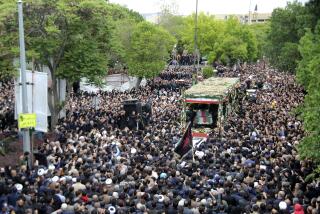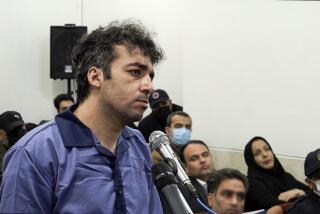Town honors executed former Hussein aides
- Share via
BAGHDAD — Angry crowds in the Iraqi town of Tikrit fired weapons in the air and chanted “God is great!” on Monday as they received the flag-draped bodies of two former aides to Saddam Hussein who were hanged early in the day.
Barzan Ibrahim Hasan and Awad Hamed Bandar were executed for their roles in killing scores of Shiite Muslim villagers in the 1980s. The hanging ripped off the head of Hasan, Hussein’s half brother and a fellow native of Tikrit.
Hasan had served as chief of Iraq’s feared intelligence service, while Bandar was in charge of the Revolutionary Court that sentenced 148 villagers to death after a 1982 assassination attempt against Hussein.
The former Iraqi president was taunted by some of those present at his execution Dec. 30, a scene captured on an unauthorized cellphone camera and distributed. The images heightened sectarian tensions between Shiite Muslims and his fellow Sunni Arabs.
Some worried Hasan’s beheading could ruffle sensibilities in a Muslim society that reveres the sanctity of corpses. But Iraqi officials described the separation of head and body as a freak accident. Government spokesman Ali Dabbagh told reporters that a doctor present at the executions signed an affidavit attesting to the unintended nature of the beheading.
Still, an official videotape of the hangings shown to Iraqi journalists did not depict the entire execution, and some voiced doubts.
“It is really rare,” said Omar Abdul-Sattar, a physician and Sunni member of Iraq’s parliament. “I am a doctor and I would not believe such a thing could happen unless the rope is too short or the defendant weighs 400 or 500 pounds.”
*
‘The head was not there’
Prosecutor Jaafar Mousawi, who witnessed Monday’s executions, said the men were side by side and hooded when the executioner released a wooden platform and sent them to their deaths.
“I saw Barzan lying on his stomach, but the head was not there,” he said during an interview with Al Arabiya, a satellite news channel. “Then I saw the head lying near a corner.”
Shiites in Dujayl, the town targeted after the 1982 assassination attempt, rejoiced Monday at news of the hangings. The once-lush agricultural center with fruit orchards and canals was bulldozed and transformed into an impoverished backwater by Hussein’s regime.
“People started distributing candies and visit each other for congratulations,” said Mohammed Zubaidi, the town’s mayor. “The happiness at the execution of Barzan was more than Saddam. He was directly in charge of what happened in the town at that time.”
But many Sunnis denounced the executions as another provocation by the Shiite-dominated government against their community. In Tikrit, the two former aides were hailed as martyrs.
“God has honored them and made them heroes for us and for every honorable Iraqi and Muslim Arabs,” said Sabah Khalil, a Tikrit resident attending the funeral of the two men, who were buried side by side near the site where Hussein was laid to rest. “They are being celebrated like grooms on their wedding nights.”
Human rights activists said the death penalty rules of the Iraqi High Tribunal fell far short of worldwide norms.
“Under the international covenant of political rights, anyone sentenced to death has the right to seek commutation,” said Richard Dicker of Human Rights Watch, a New York advocacy group. “The IHT statute explicitly prohibits commutation.”
*
Little outrage
But despite angry chanting by some of the two defendants’ fellow tribesmen, the hangings spurred little of the outrage that followed Hussein’s execution.
“The people convicted represented numbers in the file but the most important number is Saddam,” said Abdul-Sattar, the Sunni physician. “No one else could be important after his execution.”
U.S. Ambassador Zalmay Khalilzad, at the end of a news conference, brushed away a reporter’s question about Monday’s hangings. “It’s an Iraqi process, Iraqi decision, an Iraqi execution,” he said as he left the podium and exited the room.
*
Times staff writers Saif Hameed and Zeena Kareem and a special correspondent in Tikrit contributed to this report.
More to Read
Sign up for Essential California
The most important California stories and recommendations in your inbox every morning.
You may occasionally receive promotional content from the Los Angeles Times.













